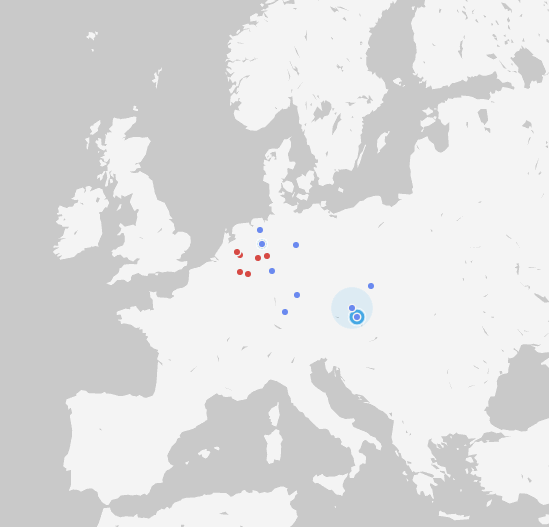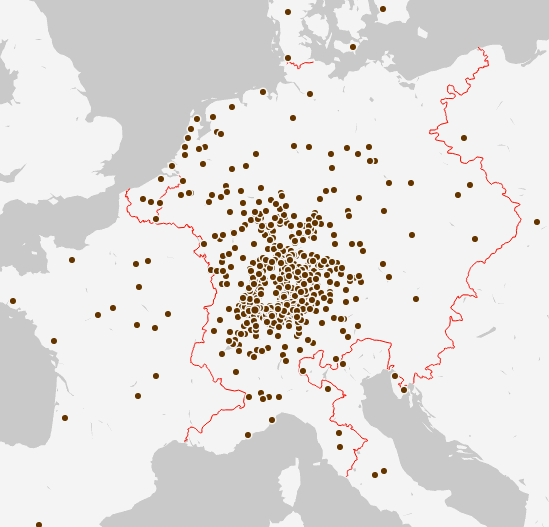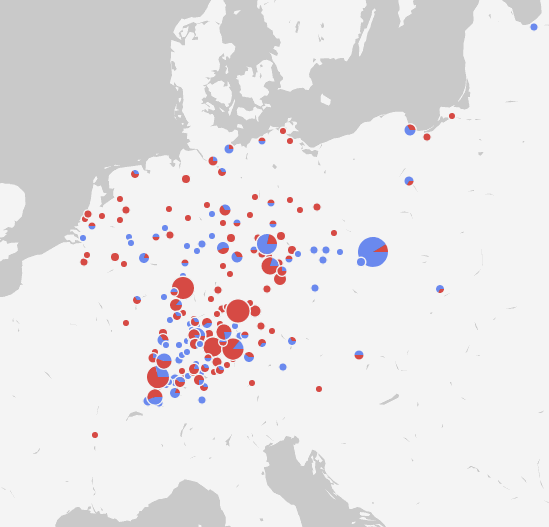The funding of the Repertorium Academicum Germanicum (RAG) by the Academies Programme of the Union of German Academies has ended on 31.12.2019 after 13 years in accordance with the programme. However, the work will be continued in a new context within the framework of the successor project Repertorium Academicum (REPAC) at the Institute of History of the University of Bern. The RAG office at the University of Giessen has been abolished.
Initial work on the RAG began in Bern at the beginning of 2001. The project was funded by the Swiss National Science Foundation until the end of 2006. From 2007 to 2019, the RAG was funded as a project of the Bavarian Academy of Sciences and Humanities (Historical Commission at the Bavarian Academy of Sciences and Humanities) within the framework of the Academies Programme by the Federal Republic of Germany, the Free State of Bavaria and the State of Hessen. Since 2008, the RAG has also been funded by the Swiss Academy of Humanities and Social Sciences as its governing body (Board of Trustees).
Repertorium Academicum Germanicum
The Graduate Scholars of the Holy Roman Empire, 1250 - 1550
The Repertorium Academicum Germanicum (RAG) is a long-term project in the field of digital humanities that records and evaluates the biographical, social and cultural data of university scholars of the Holy Roman Empire. The prosopographic database of the RAG contains information on the elites of the medieval student body: Masters or Licentiates of Arts and graduates of the three higher faculties (jurisprudence, theology and medicine). Additionally nongraduates from the noblity who attended an university are also taken into account.
Not registered are nongraduate visitors of the arts faculties (scholares simplices) as well as graduates with lower degrees (baccalaurii artium).
The aim of the RAG is to develop the history of the cultural reach of a pre-modern intellectual leadership and impulse group and to gain a comprehensive insight into the medieval origins of the modern knowledge society with around 62,000 people with 400'000 observations on their life and career paths, within the framework of an analysis of contextualized prosopography.
The illustrations on the website are published here courtesy of the University Library of Basel and the Bavarian State Archives, Secret House Archive.
New Publication
Rainer C. Schwinges: Das Leben des Kölner Magisters Gerhard von Wieringen (1451 bis nach 1501)
Mit einer Edition seines Notiz- und Rechnungsbuches (Repertorium Academicum Germanicum (RAG) – Forschungen Band 5), Zürich 2023
Download PDF:
Gerhard von Wieringen
Rainer C. Schwinges: Why were there almost no matriculation registers in late medieval European universities – except in those of the German Empire? in: History of Universities XXXVI/1 (2023), p. 34-56.
Download PDF:Schwinges, Matriculation Registers
Rainer C. Schwinges: Ein Jubiläum und eine Jubiläumsausgabe: 600 Jahre Universität Leipzig 1409 bis 2009, eine Nachlese, in: Neues Archiv für Sächsische Geschichte 93 (2022), S. 159–219.
Download PDF:
Schwinges, Nachlese
Rainer C. Schwinges: Ein sonderbarer Fall weiblichen Bildungsdrangs in der vormodernen Universität, in: FestHeft für Sylvia Paletschek, Heft 1, 2022, S. 42–45.
Kaspar Gubler, Christian Hesse, Rainer C. Schwinges (Hrsg.): Person und Wissen. Bilanz und Perspektiven (Repertorium Academicum Germanicum (RAG) – Forschungen Band 4), Zürich 2022.
Download: Person und Wissen (PDF, Open Access)
Dieser Band enthält Beiträge, die an der Bilanztagung des Repertorium Academicum Germanicum (RAG) im Schloss Münchenwiler (Kt. Bern, Schweiz) vom 2. bis 4. Oktober 2019 präsentiert wurden. Ziel der Tagung war es, Rückschau auf die Projektgeschichte des RAG zu halten, das Erreichte zu würdigen sowie Perspektiven für die Erweiterung des Projekts im Hinblick auf die Verbreitung gelehrten Wissens auszuloten.
Rainer C. Schwinges: Gelehrte von Heidelberg und anderswo: Einblicke in die Datenbank des Repertorium Academicum Germanicum (RAG), in: Heike Hawicks, Ingo Runde (Hrsg.): Universitätsmatrikeln im deutschen Südwesten. Bestände, Erschließung und digitale Präsentation. Beiträge zur Tagung im Universitätsarchiv Heidelberg am 16. und 17. Mai 2019, Heidelberg 2020, S. 275-307.
PDF Link
Rainer C. Schwinges: Aufstieg durch Bildung? Die soziale Rolle der Universitäten des 14. bis 16. Jahrhunderts, in: Soziale Mobilität in der Vormoderne. Historische Perspektiven auf ein zeitloses Thema. Akten der internationalen Tagung Brixen,Bischöfliche Hofburg und Priesterseminar, 11. bis 14. September 2019, hg. von Gustav Pfeifer und Kurt Andermann (Veröffentlichungen des Südtiroler Landesarchivs Band 48), Universitätsverlag Wagner, Innsbruck 2020, S. 173-194. PDF Link
Michael Matheus, Rainer C. Schwinges: Studying in Renaissance Rome.
The works in this volume of the RAG series are dedicated to the "Rome Studies" of persons from the Roman-German Empire, Poland and Italy during the Renaissance. The aim is not least to put the study location of Rome, which has long been underestimated in comparison to other Italian university towns, in the right light.
Download: Studieren im Rom der Renaissance(PDF, Open Access)
Szenarien

Herkunfts- und Kommunikationsräume: Gelehrte der Universitäten Köln (rot) und Wien (blau) 1365-1550.
Dieses Szenario interaktiv:https://database.rag-online.org/viewer.p/9/25/scenario/699/geo
Weitere Szenarien: https://rag-online.org/datenbank/szenarien

Gelehrte der Universität Basel 1460-1550. Herkunfts- und Kommunikationsräume (braun), Studienorte (blau), Tätigkeiten (rot). Dieses Szenario interaktiv: Dieses Szenario interaktiv: https://database.rag-online.org/viewer.p/9/25/scenario/694/geo

Gelehrte Stadtärzte (rot), Stadtschreiber (blau), Rektoren (Schule) (grün) 1250-1550.
Dieses Szenario interaktiv: https://database.rag-online.org/viewer.p/9/25/scenario/693/geo
.gif)
Juristen unter sich. Netzwerke von Gilbert Cousin (1506-1572) und Jean Matal (1517-1597)
Dieses Szenario interaktiv: https://database.rag-online.org/viewer.p/9/25/scenario/427/soc

.png)








